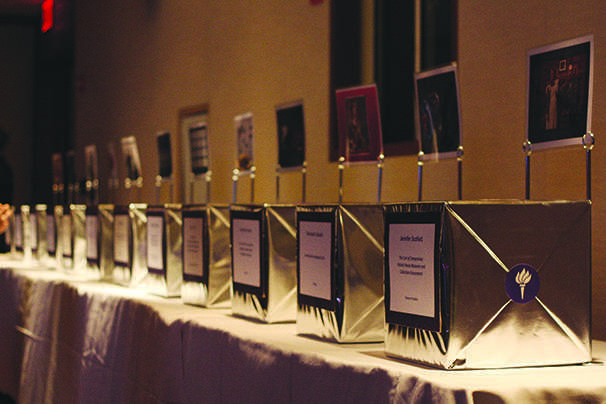
- Shawn Paik/WSN
Twelve graduate students from NYU’s Graduate College of Arts and Science presented their theses to an audience and a panel of faculty judges on April 12, each in less than three minutes.
Competing in the Threesis Academic Challenge, the students had to present in language that is accessible to a layperson and only use one presentation slide. The challenge took place in the Eisner & Lubin Auditorium at the Kimmel Center for University Life.
Director of the Master’s College at GSAS and one of the organizers of the event David Giovanella commended the students for their bravery.
“There’s no way, when I was doing my graduate work, would I have done this,” Giovanella said. “So my heart and soul goes out to them.”
The competition is organized into stages that narrow the field to 12 finalists who each receive $300 from their department or program. This year, the challenge drew 164 applicants from almost all of the departments and programs at GSAS. Of these, 84 moved into to the mentoring stage, 67 continued into the next round and 56 participated in the semifinal round, which took place on April 11. The finalists were selected from this group based on three criteria: expertise in their respective fields, the ability to communicate clearly in accessible language and the ability to give an engaging presentation.
The presentations given at the event covered a wide range of research subjects, including dental implants, workplace discrimination against lesbians, the effects of World War II on modern literature and DNA alteration. The 12 finalists were Allison Collins and Elizabeth Crawford from the Draper Interdisciplinary Program in Humanities and Social Thought, Shashank Gandhi and Sara Storer from the biology department, Sarah Harris from the German department, Emma Mishel from the applied quantitative research program, Grace Pan from the environmental health sciences program, Hannah Puckett from the European and Mediterranean studies department, Jennifer Scofield from the museum studies department, Tom Sercu from the data science program, Caroline Song from the bioethics department and Zhiyang Yu from the mathematics in finance program.
After the presentations, awards were given for first place, second place and audience choice. The second place prize of $750 was awarded to Yu for his presentation on trends in the stock market. The first place prize and the audience choice award both went to Harris for her presentation on automatons in literature. She received $750 for audience choice and $1000 for first place from GSAS.
Harris said she plans to use the money to fund her continuing studies in Germany this summer.
“This is amazing,” Harris said at a reception held after the event. “I got to participate, I got to talk about something that I really enjoy talking about, that normally people don’t want to listen to.”
Marit Coyman-Mykelbust, a museum studies master’s student who participated in the early stages of the competition said the skills students learn from this competition are beneficial.
“To condense it into three minutes is really hard, but it makes you think of your research in a really different way,” Coyman-Mykelbust said. “Making you use language that anyone can understand was a really great exercise.”
A version of this article appeared in the Monday, April 14 print edition. Scott Mullen is a deputy news editor. Email him at [email protected].

























































































































































